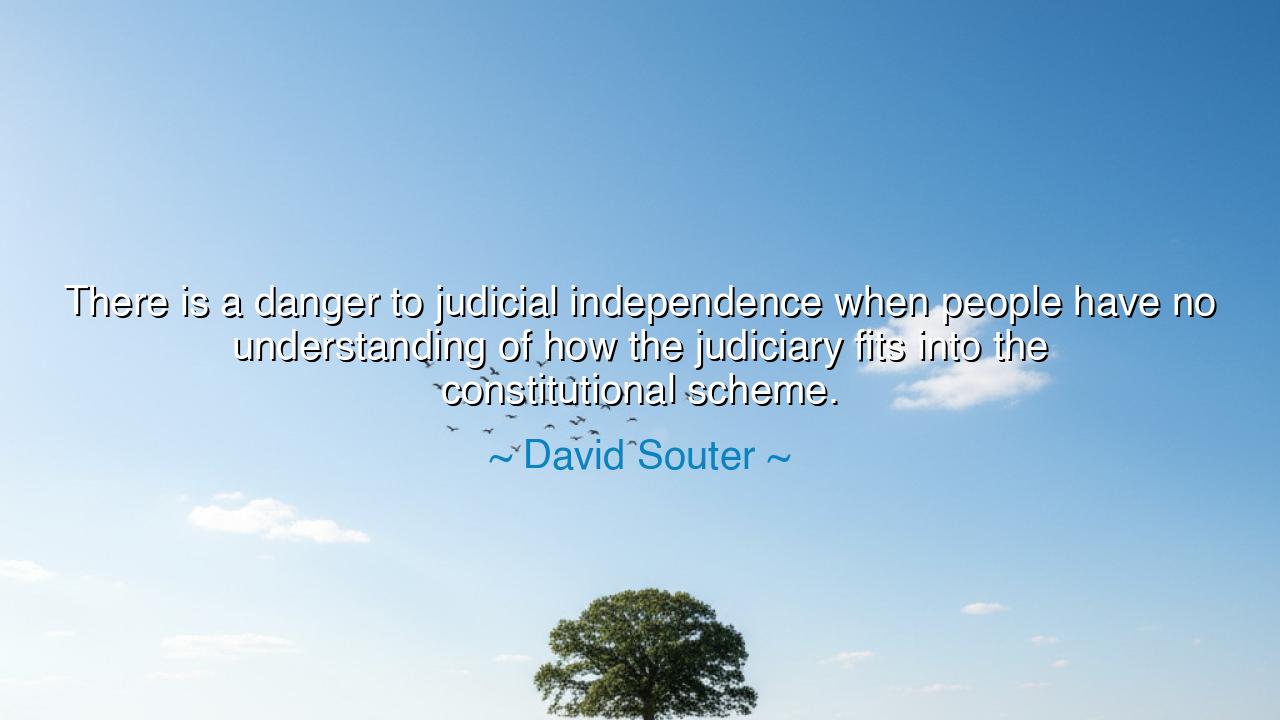
There is a danger to judicial independence when people have no
There is a danger to judicial independence when people have no understanding of how the judiciary fits into the constitutional scheme.






In the quiet wisdom of ages past, the words of Justice David Souter rise like a solemn bell in a storm: “There is a danger to judicial independence when people have no understanding of how the judiciary fits into the constitutional scheme.” These are not the words of a mere jurist, but the utterance of a guardian — one who has looked into the heart of democracy and seen its fragility. To understand him is to understand that the judiciary, that pillar of judgment and restraint, stands only as firm as the people’s faith in it — and that faith depends upon understanding. Without knowledge, freedom erodes; without respect for balance, justice collapses.
The ancients taught that ignorance is a slow poison — it does not kill the body, but it corrodes the mind and soul of a people. Justice Souter warns us of that same poison, disguised in modern garments. When citizens cease to know how judicial independence safeguards their liberty, they become easy prey for demagogues and partisans who would shatter the scales of justice for their own gain. The courts, which should stand above the tempest of politics, become dragged into the mud of passion and prejudice. Thus, what was built to protect all becomes a weapon wielded by the few.
Consider, my listener, the story of Socrates, that wise philosopher of Athens, condemned to death by the very democracy he sought to enlighten. His only crime was the pursuit of truth. But the people, inflamed and ignorant of the deeper justice, let the fever of the crowd outweigh the law of reason. In their blindness, they silenced the conscience of their city — and Athens, the cradle of thought, fell into decay. So too, in our time, if the people do not understand how the judiciary fits into the constitutional scheme, they may turn against it, thinking it their enemy when it is in fact their shield.
Judicial independence is not a privilege of judges; it is the armor of the people. It ensures that no ruler, no faction, no mob can dictate what justice must be. When a judge renders judgment free from fear or favor, the republic itself breathes more freely. But when the people forget this — when they think judges exist to serve their side, their tribe, their momentary anger — the sacred covenant of the Constitution begins to crumble. What follows is not law, but chaos dressed in the costume of law.
History, ever the teacher of fools, gives us dire examples. In the waning days of the Roman Republic, the people turned against their courts, seduced by the promise of quick justice from their generals. Caesar crossed the Rubicon not only in defiance of the Senate, but in defiance of the rule of law. The people cheered — and in their cheers, the Republic died. Rome gained an emperor but lost her liberty. Such is the peril that Justice Souter foretells: when understanding fades, independence falters, and the mighty foundations of governance turn to dust.
Therefore, O seeker of wisdom, you must not be content to live in the shadow of ignorance. Learn how your judiciary stands as a balancing pillar between liberty and tyranny. Teach your children that the Constitution is not merely parchment, but the living spirit of restraint and order. When you see a court stand against the will of the mob, do not cry treason — cry praise, for that resistance is the mark of freedom. For only when law stands above power can power serve the people.
The lesson, then, is both grave and luminous: Understanding is the foundation of freedom. To preserve judicial independence, one must preserve knowledge — civic, moral, historical. Read, question, seek truth. Defend the court’s right to be unpopular when justice demands it. For popularity shifts like sand, but principle endures like stone. If each generation forgets this, liberty will perish not by invasion, but by amnesia.
So remember, children of tomorrow: cherish the independence of your judges, not because they are perfect, but because they stand as the last guardians between order and the abyss. When you hear voices that mock the law or scorn the Constitution, answer not with wrath but with wisdom. Speak as the ancients would — calmly, bravely, and with the dignity of those who understand that justice, once corrupted, cannot easily be restored. For the republic is not sustained by armies or wealth, but by the understanding hearts of its people.






AAdministratorAdministrator
Welcome, honored guests. Please leave a comment, we will respond soon